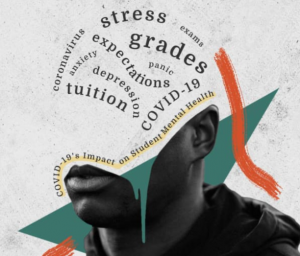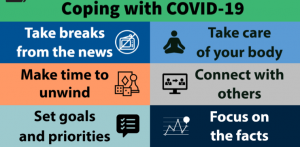 The devastating impact of the coronavirus disease 2019 (“COVID-19”) has been catastrophic in the United States and all around the globe, affecting the lives of millions of people. Since the first confirmed case in 2019, the virus has rapidly continued to grow and has infected over 30 million people in the U.S., according to data by Johns Hopkins University. A year after the COVID-19 outbreak was declared to be a public health emergency and citizens were urged to isolate and quarantine to prevent exposure, many states are moving closer to lifting all restrictions since vaccinations are underway. Although businesses are fully operating again and schools have reopened, the long-term psychological consequences of the COVID-19 pandemic have been far-reaching and unprecedented among the nation. Throughout history, studies have shown that disease outbreaks have been followed by psychosocial impacts amplifying individual’s fear and anxiety, which eventually become more pervasive than the pandemic itself. Mental health and emotional issues have been among the foremost public health concerns throughout the world since the peak of the pandemic. The general population has faced mental health problems, specifically, vulnerable groups such as healthcare personnel, university and college students.
The devastating impact of the coronavirus disease 2019 (“COVID-19”) has been catastrophic in the United States and all around the globe, affecting the lives of millions of people. Since the first confirmed case in 2019, the virus has rapidly continued to grow and has infected over 30 million people in the U.S., according to data by Johns Hopkins University. A year after the COVID-19 outbreak was declared to be a public health emergency and citizens were urged to isolate and quarantine to prevent exposure, many states are moving closer to lifting all restrictions since vaccinations are underway. Although businesses are fully operating again and schools have reopened, the long-term psychological consequences of the COVID-19 pandemic have been far-reaching and unprecedented among the nation. Throughout history, studies have shown that disease outbreaks have been followed by psychosocial impacts amplifying individual’s fear and anxiety, which eventually become more pervasive than the pandemic itself. Mental health and emotional issues have been among the foremost public health concerns throughout the world since the peak of the pandemic. The general population has faced mental health problems, specifically, vulnerable groups such as healthcare personnel, university and college students.
Healthcare professionals are particularly vulnerable to mental health problems, as studies revealed numerous emotional outcomes, including stress, depression irritability, insomnia, fear, confusion, anger, frustration, boredom, and stigma associated with quarantine. Such emotional distress is associated with their risk of exposure to the virus, fear of infecting their loved ones, shortages of personal protective equipment, and extensive work-hours due to the exponential increase in the demand for healthcare. These extraordinary times highlight the pressing need to ensure that the months ahead do not cause long lasting damage to healthcare professionals. Moving forward, supervisors should provide psychological support measures and prioritize time for staff to reflect on and learn from the extraordinary difficult experiences to create a hopeful rather than traumatic narrative of the current pandemic.
 In the wake of the COVID-19 outbreak, university and college students faced an interruption in their spring semester and were expected to continue their academic work from home. Due to the rapid shift to remote learning, student activities such as study abroad trips, internships, and graduation ceremonies were either cancelled, indefinitely postponed, or conducted by virtual formats. The transition to online learning left many students discouraged that their personal and professional milestones have been left unfulfilled. Not only has their engagement in university life and experiences been compromised, but housing has been a prolonged dilemma for many students. Some students are at risk for housing insecurity while others returned to unwelcomed, and violent circumstances at home. From magnifying their financial hardships, negatively affecting their learning and overall satisfaction with their academic experience, and placing them in troubled housing circumstances, the pandemic has dangerously worsened students’ mental health. Data from recent student interviews show that of 195 students, 71% indicated increased stress and anxiety due to the COVID-19 outbreak.
In the wake of the COVID-19 outbreak, university and college students faced an interruption in their spring semester and were expected to continue their academic work from home. Due to the rapid shift to remote learning, student activities such as study abroad trips, internships, and graduation ceremonies were either cancelled, indefinitely postponed, or conducted by virtual formats. The transition to online learning left many students discouraged that their personal and professional milestones have been left unfulfilled. Not only has their engagement in university life and experiences been compromised, but housing has been a prolonged dilemma for many students. Some students are at risk for housing insecurity while others returned to unwelcomed, and violent circumstances at home. From magnifying their financial hardships, negatively affecting their learning and overall satisfaction with their academic experience, and placing them in troubled housing circumstances, the pandemic has dangerously worsened students’ mental health. Data from recent student interviews show that of 195 students, 71% indicated increased stress and anxiety due to the COVID-19 outbreak.
 Additionally, a vast majority of the participants indicated difficulty with concentration, disruption of sleep and eating patterns, increased levels of social isolation, and concerns about academic performance. It is clear that colleges and universities must adapt their understanding of the mental health risk factors of students and develop innovative strategies to address the mental health needs and concern of their students to help them thrive in this crisis. In conclusion, the COVID-19 pandemic has alarming short- and long-term implications for public health. With a growing recognition that the instability of this pandemic will be present for some time, education and training regarding mental health issues should be integrated into the overall public health response during and after the pandemic.
Additionally, a vast majority of the participants indicated difficulty with concentration, disruption of sleep and eating patterns, increased levels of social isolation, and concerns about academic performance. It is clear that colleges and universities must adapt their understanding of the mental health risk factors of students and develop innovative strategies to address the mental health needs and concern of their students to help them thrive in this crisis. In conclusion, the COVID-19 pandemic has alarming short- and long-term implications for public health. With a growing recognition that the instability of this pandemic will be present for some time, education and training regarding mental health issues should be integrated into the overall public health response during and after the pandemic.



 The devastating impact of the coronavirus disease 2019 (“COVID-19”) has been catastrophic in the United States and all around the globe, affecting the lives of millions of people. Since the first confirmed case in 2019, the virus has rapidly continued to grow and has infected over 30 million people in the U.S., according to data by Johns Hopkins University. A year after the COVID-19 outbreak was declared to be a public health emergency and citizens were urged to isolate and quarantine to prevent exposure, many states are moving closer to lifting all restrictions since vaccinations are underway. Although businesses are fully operating again and schools have reopened, the long-term psychological consequences of the COVID-19 pandemic have been far-reaching and unprecedented among the nation. Throughout history, studies have shown that disease outbreaks have been followed by psychosocial impacts amplifying individual’s fear and anxiety, which eventually become more pervasive than the pandemic itself. Mental health and emotional issues have been among the foremost public health concerns throughout the world since the peak of the pandemic. The general population has faced mental health problems, specifically,
The devastating impact of the coronavirus disease 2019 (“COVID-19”) has been catastrophic in the United States and all around the globe, affecting the lives of millions of people. Since the first confirmed case in 2019, the virus has rapidly continued to grow and has infected over 30 million people in the U.S., according to data by Johns Hopkins University. A year after the COVID-19 outbreak was declared to be a public health emergency and citizens were urged to isolate and quarantine to prevent exposure, many states are moving closer to lifting all restrictions since vaccinations are underway. Although businesses are fully operating again and schools have reopened, the long-term psychological consequences of the COVID-19 pandemic have been far-reaching and unprecedented among the nation. Throughout history, studies have shown that disease outbreaks have been followed by psychosocial impacts amplifying individual’s fear and anxiety, which eventually become more pervasive than the pandemic itself. Mental health and emotional issues have been among the foremost public health concerns throughout the world since the peak of the pandemic. The general population has faced mental health problems, specifically,  In the wake of the COVID-19 outbreak, university and college students faced an interruption in their spring semester and were expected to continue their academic work from home. Due to the rapid shift to remote learning, student activities such as study abroad trips, internships, and graduation ceremonies were either cancelled, indefinitely postponed, or conducted by virtual
In the wake of the COVID-19 outbreak, university and college students faced an interruption in their spring semester and were expected to continue their academic work from home. Due to the rapid shift to remote learning, student activities such as study abroad trips, internships, and graduation ceremonies were either cancelled, indefinitely postponed, or conducted by virtual  Additionally, a vast majority of the participants indicated difficulty with concentration, disruption of sleep and eating patterns, increased levels of social isolation, and concerns about academic performance. It is clear that colleges and universities must adapt their understanding of the mental health risk factors of students and develop innovative strategies to address the mental health needs and concern of their students to help them thrive in this crisis. In conclusion, the COVID-19 pandemic has alarming short- and long-term implications for public health. With a growing recognition that the instability of this pandemic will be present for some time, education and training regarding mental health issues should be integrated into the overall public health response during and after the pandemic.
Additionally, a vast majority of the participants indicated difficulty with concentration, disruption of sleep and eating patterns, increased levels of social isolation, and concerns about academic performance. It is clear that colleges and universities must adapt their understanding of the mental health risk factors of students and develop innovative strategies to address the mental health needs and concern of their students to help them thrive in this crisis. In conclusion, the COVID-19 pandemic has alarming short- and long-term implications for public health. With a growing recognition that the instability of this pandemic will be present for some time, education and training regarding mental health issues should be integrated into the overall public health response during and after the pandemic.